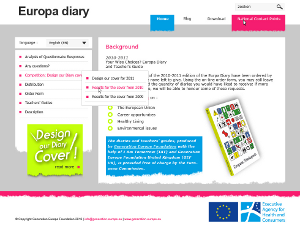 The Europa Diary and accompanying Teachers’ Guide are European Commission publications. The diary contains short, informative and thought-provoking texts on a range of issues related to the European Union (EU). Texts are divided into five sections: About the European Union; My studies, my future; My environment; My rights, my choices; My health, my safety; and Beyond our borders. The texts specifically address the relevance of the issues to the everyday lives of young people. The focus is on providing basic information, providing links to further information, and raising questions for further thought and discussion. The 2011-2012 Europa Diary is currently being delivered to 27,000 schools across the EU.
The Europa Diary and accompanying Teachers’ Guide are European Commission publications. The diary contains short, informative and thought-provoking texts on a range of issues related to the European Union (EU). Texts are divided into five sections: About the European Union; My studies, my future; My environment; My rights, my choices; My health, my safety; and Beyond our borders. The texts specifically address the relevance of the issues to the everyday lives of young people. The focus is on providing basic information, providing links to further information, and raising questions for further thought and discussion. The 2011-2012 Europa Diary is currently being delivered to 27,000 schools across the EU.
Local partners in each of the 27 EU Member States review and adapt the content of the diary, so that it is specifically relevant to young people in the target country; the European Commission approves the final content of the diary. As the diary is adapted to different countries and cultures, so is the website. Besides the actual diary which is delivered free of charge to secondary schools in the European Union which request it, there’s a website available in 21 languages and 28 national versions (two for Belgium), so that everybody can have access to the information in their mother tongue and specifically for their country.
How can the Europa Diary website be available in so many languages? The webmaster, Daniel Pyster, chose the WPML plugin to make the site multilingual. We held an interview with him, where Daniel stated they’ve been using the plugin for a year now and that they’re very happy with it. “It handles all the languages – even in the Cyrillic and Greek alphabets – and it’s easy to customize,” he said.
Generation Europe Foundation, the organization behind the Europa Diary, works with its own team of translators who deal with the actual diary translations as well as with the website content; it is a big challenge. Local partners take the translations sent by email and adapt them to the local context – in the end, resulting in 28 different versions, which then have to be approved by the European Commission. As for the website, Daniel manages all the pages in the 21 languages from the WPML dashboard. He is exploring the use of the translator role added by the WPML plugin so that local partners will be able to access and modify the pages for their own countries.
Generation Europe Foundation is the sole contractor of the European Commission for the development, printing and distribution of the Europa Diary and maintains the website www.europadiary.eu as part of the EC framework contract.
Daniel Pyster
Editor, Generation Europe Foundation

